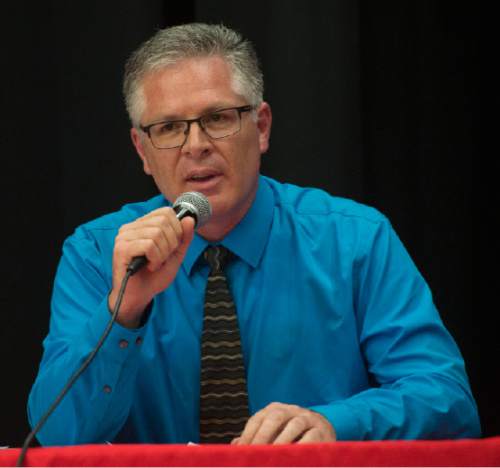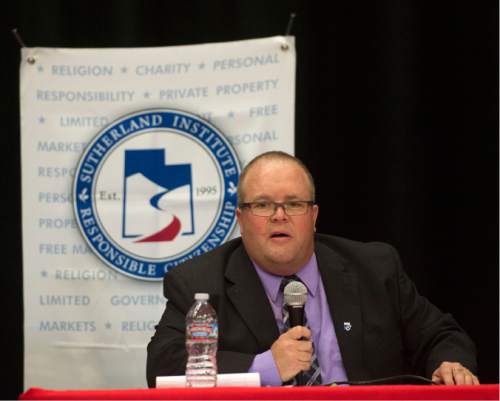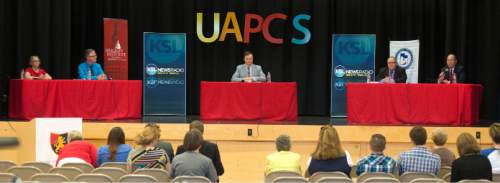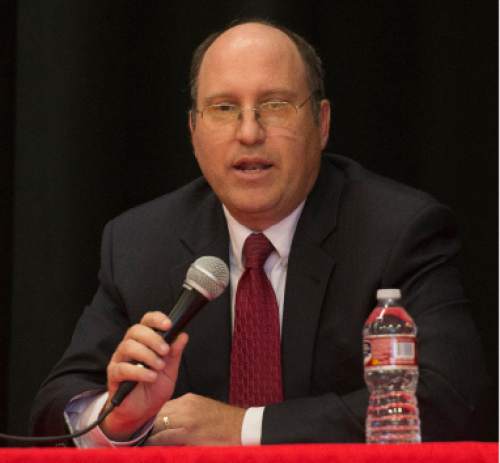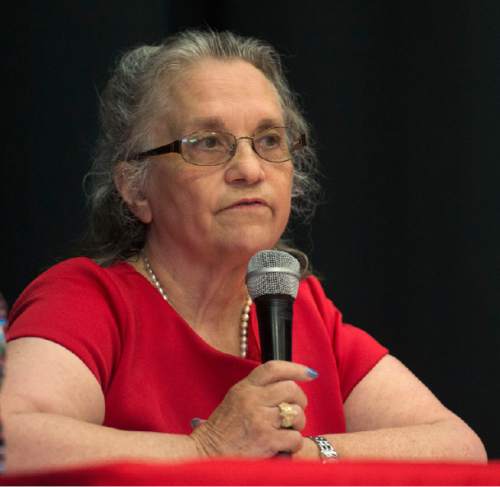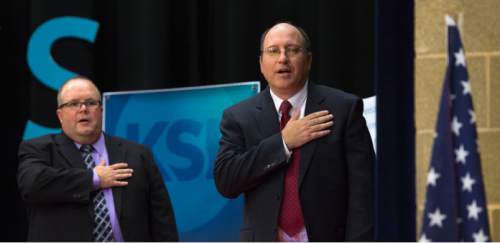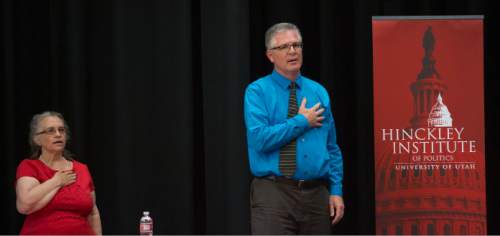This is an archived article that was published on sltrib.com in 2016, and information in the article may be outdated. It is provided only for personal research purposes and may not be reprinted.
Layton • Incumbent state school board Vice Chairman David Thomas defended his record against three election challengers during a debate Wednesday evening.
He touted his role in updating accounting practices at the state Office of Education, advocating for ACT testing for all students and leading the effort to create a master plan for technology in Utah classrooms.
And during his eight years as a school board member, he said, the state's national academic rankings have improved.
"I don't believe in the latest fad," Thomas said. "I believe in things that actually work."
But his approach and that of other incumbent school board members were directly and indirectly challenged by candidates Elizabeth Carlin, Brad Asay and Brent Strate, who are running to unseat Thomas in November's election.
A fifth candidate for Thomas' seat, Jennifer Graviet, was absent during Wednesday's debate, which was the second in a series of school board debates sponsored by KSL, Sutherland Institute, Hinckley Institute of Politics and the Utah Association of Public Charter Schools.
Candidates were not allowed to address each other directly or offer rebuttals, but Strate specified that four out of the five candidates are professional educators — Thomas, an attorney, being the exception.
Strate praised the state's education system and said the success of schools is due to excellent teachers who require support and autonomy, rather than oversight, from the state school board.
"I don't know that we, as teachers, work for you," Strate said. "We work together."
The debate was moderated by KSL Newsradio's Ethan Millard, who began by asking the candidates what type of school standards and tests they would support as board members.
The school board has come under frequent fire in recent years for its adoption of the Common Core State Standards in math and English, and for the development of the computer-adaptive SAGE test that is given to students each year and used as the basis of school grading.
Gov. Gary Herbert and his Republican challenger, Jonathan Johnson, have called on the board to cease Common Core and SAGE testing.
Last month, board members voted to review and update the state's math and English standards and cease SAGE testing in high school, dependent on action and financial support from the Legislature.
Thomas said there is a need to improve annual testing to produce data that inform instruction. He added that while statewide standards are regularly in need of maintenance, they produce the equitable education system guaranteed to every student by the Utah Constitution.
"Students in Moab or St. George or Clearfield should have the same opportunity," he said. "Standards-based education is essential if we want to get our kids to college and career readiness."
Carlin said tests should be designed and implemented by classroom educators. Rather than enforce strict guidelines, she said the state school board should operate as a liaison, communicating the needs of schools and school district to Utah lawmakers.
"I think the state school board is a gatherer of information, rather than a group that decides what is and is not needed in the classroom," she said.
Candidates also were asked about Utah's teacher shortage, which sees districts struggling to recruit and retain classroom educators each year alongside declining enrollment in education programs at the college and university level.
Asay, president of Utah's chapter of the American Federation of Teachers, said Utah's educators are not given the salaries they need to support their families and are regularly ignored during discussion of education policy.
"They would stay in the profession if they were treated as professionals," he said. "They have to be trusted and given the autonomy to teach their students and not saddled with top-down mandates."
Thomas agreed on the need for higher salaries, particularly entry-level pay.
But he added that Utah's teacher shortage is the result of qualified professionals being unable to work in schools without an education degree.
He pitched an alternate route to the classroom that would allow an experienced candidate to pass a course-content test and be assigned a mentor teacher for his or her first three years at a school.
"The exclusivity of the profession provides part of the problem," he said. "I'm in favor of a new pathway in addition to teacher preparation programs."
All four candidates expressed their opposition to partisan school board elections, which are scheduled to begin next year unless lawmakers revisit the issue in January.
Carlin said the law "is what it is," while Thomas, Asay and Strate spoke against the addition of partisan politics to the education system.
"The people in the state of Utah are not in favor of partisan elections at the school board level," Strate said. "You don't want a loyalty oath like they've tried to do in Utah County in regards to the party."
Asay said he worried lawmakers would try to add partisan elections to local district school board elections, which are nonpartisan under the latest change to state law.
He said the voice of Utah voters has been ignored by lawmakers on the issue.
"We do not need that kind of divisiveness on our boards of education in our school system."
Eight seats on the 15-member state school board are up for election this year.
Candidates will first face off during the June 28 primary, with the two winning candidates for each board district advancing to November's general election.
Additional debates are scheduled for June 15, 16, 18, 22 and 23 in Salt Lake and Utah counties.
Royce Van Tassell, executive director of the Utah Association of Public Charter Schools, said another round of debates will be held in the fall, before the general election.
"We wanted to avoid voters not knowing who the candidates for the state Board of Education are," he said.
Additional information and locations for the debates are available at utahcharters.org.
Twitter: @bjaminwood


